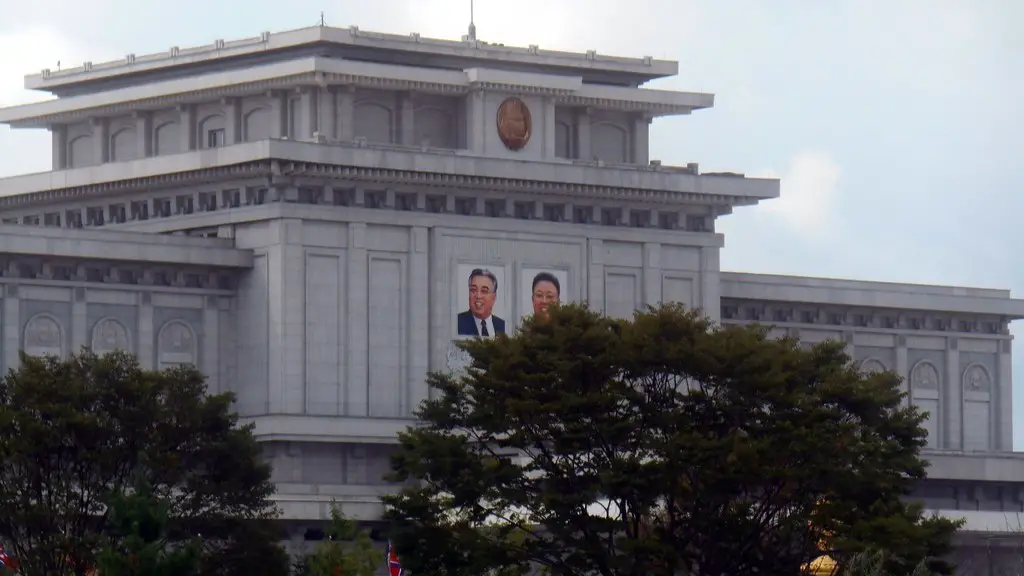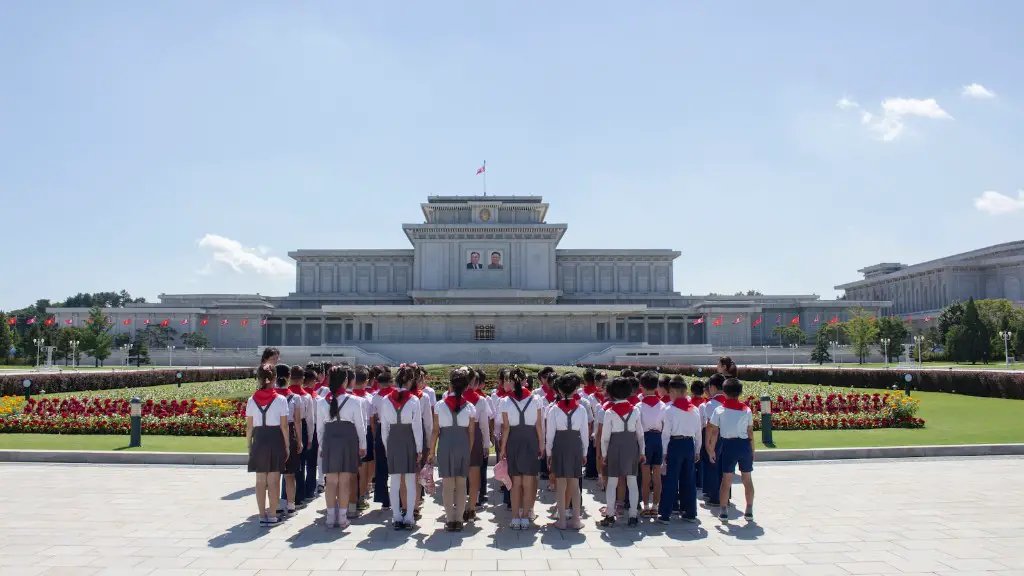North Korea has become a top priority focus for many countries. It has a long history of using repression to keep itself closed off from the world, as well as engaging in provocative activities that cause international concern. But why is North Korea cut off from the world? This article will explore the history, politics and culture of the country to understand why North Korea is so switched off from the world.
To begin with, it is important to understand the origins of North Korea. The country has a long history of authoritarian rule, which can be traced back to the 1950s. It was then that North Korea established an oppressive, totalitarian regime which was dedicated to the pursuit of self-sufficiency and absolute control over its people. This was done through a variety of measures, including the implementation of restrictive laws, the promotion of state propaganda and the creation of a heavily-controlled economy. As a result, North Korea became one of the most isolated countries in the world.
In addition to its long-standing practice of isolationism, North Korea has also engaged in aggressive military activities. The country has used its nuclear capabilities to flex its muscles and has engaged in several well-documented provocations, such as the sinking of the South Korean warship ROKS Cheonan in 2010 and the shelling of Yeonpyeong Island that same year. This has only served to deepen the mistrust between North Korea and the rest of the world.
The North Korean government also enforces a rigid censorship regime, which prevents its people from accessing information from the outside world. It is virtually impossible for North Koreans to access the internet or access foreign media, as there is only a limited number of sanctioned websites that are heavily monitored. This has been effective in isolating the country and preventing the people from receiving anything beyond what the government wants them to know.
Another factor that contributes to North Korea’s isolation is its economic situation. The country is one of the poorest in the world, with an estimated GDP of just $40 billion. This has led to persistent food shortages, a lack of economic opportunities and a reliance on international aid for basic needs. This lack of economic development has also been effective in isolating the country and keeping it largely closed off from the outside world.
In sum, North Korea is one of the most isolated countries in the world, due to its long history of authoritarian rule and its aggressive military activities. It also has strict censorship policies and an impoverished economy, which contributes to its isolation. These factors have all combined to create a situation where North Korea remains largely switched off from the rest of the world.
Preemptive Measures
The international community has taken a number of preemptive measures to try and dissuade North Korea from further provocative activities. On one hand, there have been a number of economic sanctions and travel bans that have been placed on the country. On the other hand, there have also been efforts to engage with North Korea and try to find an alternative path that does not involve provocation. So far, these efforts have been largely unsuccessful, as North Korea has continued to engage in aggressive behavior and shows no signs of changing course.
However, some progress has been made in terms of reducing tensions. For instance, in 2018, North and South Korea held a series of negotiations and were able to reach a number of agreements, including an end to hostile acts, a commitment to denuclearization and a plan to work together to improve inter-Korean relations. While these talks have stalled in recent months, it is still a step forward in terms of reducing tensions and beginning to build trust between the two sides.
Furthermore, the international community has also sought to get North Korea to open up through diplomatic means. For instance, in 2018, the United Nations passed a resolution calling on North Korea to allow in international journalists and human rights inspectors. While these efforts have largely been unsuccessful thus far, they still show the effort by the international community to try and engage with North Korea and bring it out of its self-imposed isolation.
The international community also has tried to encourage North Korea to engage in economic reform. Recently, China and the United States have sought to incentivize North Korea in its economic reform efforts. This has included providing aid and financial support for economic reforms, as well as helping to open up North Korea to the global market. While this has seen some progress in terms of opening up North Korea’s economy, the progress has been slow and there is still a long way to go.
Policy Solutions
With the understanding of why North Korea is so switched off from the world, it is important to consider what policy solutions can be implemented to encourage it to open up. On one hand, the international community could continue its strategy of putting pressure on North Korea and imposing economic and diplomatic sanctions on the country until it agrees to open up. However, this is likely to be more effective in creating a tense and adversarial atmosphere than in creating a pathway to engagement.
On the other hand, there is also the option of pursuing a path of engagement and diplomacy, as has been done in other conflicts. This could involve offering economic and political incentives for North Korea to engage with the world, as well as offering diplomatic recognition and normalized relations. This could create an environment of trust and understanding, which could ultimately lead to greater openness and dialogue between North Korea and the rest of the world.
Additionally, the international community could also focus on supporting economic reform in North Korea. This could include providing economic aid and technical assistance to help North Korea transition to a more open and market-oriented economy. This could be coupled with a strategy that seeks to engage North Korea diplomatically, allowing for a more meaningful dialogue between the country and the world.
Role Of Cultural Exchange
In addition to political and economic solutions, it is also important to consider the role of cultural exchange in encouraging North Korea to open up. Cultural exchange initiatives, such as cultural festivals and arts and crafts exhibitions, have been used in other contexts to help build trust between adversarial nations. In North Korea, such initiatives could create an environment of understanding and mutual respect, which could lead to a better understanding of the country and greater dialogue between its citizens and the international community.
Furthermore, cultural exchange could also provide North Koreans with access to new ideas and concepts. This could help to create the conditions for open debate and discussion within the country, which could help bring about meaningful reform and greater openness. Additionally, such initiatives could help promote education and the spread of new ideas, which could spur economic growth and lead to more sustainable development within North Korea.
Role Of Technology
Finally, it is also important to consider the role of technology in encouraging North Korea to open up. Technology has the potential to level the playing field in terms of access to information, as it can help North Koreans access information from the outside world without having to go through the traditional means of censorship and control. Additionally, technology can also be used for educational purposes, as it could be used to spread knowledge and understanding of the outside world.
Furthermore, technology can also be used to facilitate dialogue between North Koreans and the outside world. For instance, a number of initiatives, such as Free Korea and Uncharted North, have been using online platforms to connect people in North Korea with people outside the country. This has allowed for the spread of ideas and the fostering of greater understanding between the two sides.
In addition, technology could also be used to facilitate economic reform in North Korea. For instance, cryptocurrency, which is already being used in North Korea, could be used to help North Koreans access foreign markets and facilitate the sale of goods and services. This could create new economic opportunities and allow North Korea to pursue a more open, market-oriented economy.
International Support
Ultimately, it is clear that while there are a number of potential solutions to the problem of North Korea’s isolation, there is still much work to be done. The international community has so far been unsuccessful in its attempts to engage with North Korea, and it remains unclear how open the country is willing to be. As such, it is important for the international community to continue to pursue diplomatic and economic solutions, as well as to provide support for those attempting to engage with North Korea through cultural and technological means.
That said, it is also important to recognize that ultimately, it is up to the North Korean people to decide how open they want to be to the outside world. If the North Korean government is truly committed to opening up, then it is up to them to take the necessary steps to make that happen. In the meantime, it is up to the international community to support the North Korean people and to continue to engage in dialogue with the country in order to create a more open relationship.





